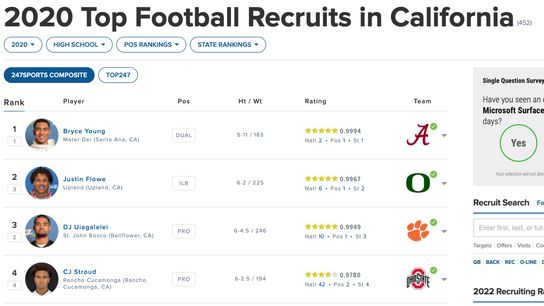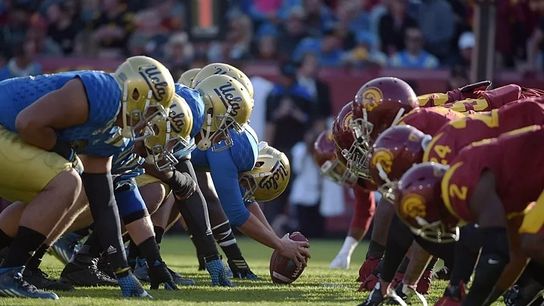George Kliavkoff knew the question was coming, which is why the 54-year-old sports and media executive put his reading glasses on ahead of time. Kliavkoff's first question as the Pac-12's new commissioner was a simple one with a complex answer: How do you fix Pac-12 football?
Look, Kliavkoff is not who I or anyone in the college football community would've hired to run the Pac-12. Jon Wilner tweeted ahead of Thursday's announcement that the hire be someone whom 99 percent of people in college athletics had heard of, and he was correct. I know I had never heard Kliavkoff's name before today.
But you don't have to be Greg Byrne or Gene Smith to know that the football product is the Pac-12's -- let's put this politely -- most undervalued asset right now, and so when asked Kliavkoff came prepared to address the elephant in the room with a fork and knife.
"My work on football will begin with meetings with ADs and coaches, and with my new colleagues at the conference office. I believe personally the solution of elevating Pac-12 football is a combination of addressing structural issues and a more focused approach on recruiting.
"I'll be pushing to expand the college football playoffs. I believe that it's not good for college football and for the vast majority of college football fans when 20 of the 28 CFP bids, 71 percent, go to just four schools," he said.
From the Pac-12's perspective, Kliavkoff is exactly right. Expanding the CFP won't fix all the Pac-12's problems, but it can be part of the solution on both ends. A playoff with a guaranteed berth for the Pac-12 champion means that more teams remain eligible for the national championship for a much longer period of time. Under the current structure, an 12-1 Oregon State team may very well get shut out of the CFP and an 11-2 Beavers team would have no shot. With an expanded playoff, a 3-2 Oregon State team would still take the field with its national championship hopes intact. So long as you're alive for your division title, you're alive for the national title.
This, the thinking goes, keeps more fans engaged, thereby driving revenue on the front end (by getting more fans to come to games) and the back end (by getting more fans to watch on TV). It also means every Pac-12 coach can look a recruit in the eye and tell him it's possible to win -- or at least play for -- a national championship at that school and really mean it.
Kliavkoff also said the Pac-12 would look at scheduling -- both in terms of what days and what times games are played -- with regards to how the conference office affected the competitive product. He's referring to two things hear, as I understand it. First, the conference also stacked the deck against its own best teams by making them play back-to-back road games. It's also a reference to #Pac12AfterDark, though I'm not convinced the Pac-12 actually plays more night games than other leagues, and the ones that does (at least those televised by ESPN) draw consistently higher ratings than Pac-12 games played in head-to-head competition against other leagues. Still, the thesis here is Kliavkoff will make sure the Pac-12 conference office is a help to its member schools in regards to scheduling, not a hindrance. "Everything is up for review to make us more competitive," he said.
Kliavkoff also said this:
"Finally on structure, we're going to invest to create standardized technology at the conference level to help the schools recruit and be more competitive on the field,"
I don't know what this means, but I do know that if I worked in football at a Pac-12 school, my ears would've perked up upon hearing it.
"With respect to recruiting, I think there are lessons to be learned from public and private institutions that make their lifeblood on being able to retain and attract great talent," he said. "I think we have to learn some of these lessons, particularly from our Silicon Valley friends."
This part made me cringe a little bit, not going to lie. Moving on...
"We need to make sure our high school athletes understand the lifetime value of a Pac-12 education. We need to be more aggressive about teaching the legacy of the Pac-12 as the conference of champions. At the conference level, we will invest to give Pac-12 athletes -- football players and others -- the opportunity to create a bigger social platform. We believe video creation and other tools help the athletes, and once NIL comes into effect, that will help the athletes substantially.
We will be a proponent of a consistent and fair approach to name, image and likeness legislation and we believe that's a competitive advantage because of the markets we play in and the opportunity that some athletes will have to start immediately."
This is where the Pac-12 can make gains that no other conference can match. Washington may not have as many diehards as, say, Tennessee, but Tennessee can't sell proximity to Amazon and Microsoft. No can sell their connection to Nike like Oregon can. Same as Cal and Stanford with Silicon Valley, and same as USC and UCLA with Hollywood.
The Pac-12 should lean all the way in here, as far as gravity will allow.
The Pac-12's issues, I believe, are a classic chicken-egg scenario. The conference doesn't compete for titles like its peer conferences because it doesn't have the same amount of difference-making players. And it doesn't have the same number of difference-makers because those kids don't see Pac-12 schools competing for titles.
Which is how this happens:

It's an overarching problem that must be solved in the boardroom with TV and conference executives as well as in the living rooms of elite 17-year-old kids in So Cal, Phoenix and Las Vegas.
Amid an overall positive debut, the other portion that gave me pause was when Kliavkoff listed revenue generation as a priority ahead of fixing the on-field product.
Putting the product as a priority below making money off the product was cart-before-the-horse thinking that the Pac-12 was supposed to leave behind with the Larry Scott era, when getting a foothold in the Chinese market was an equal priority to getting teams in the Playoff, if not a bigger one. Unless the Pac-12 leans heavily into gambling partnerships (which is unlikely given how uppity its presidents are) the Pac-12 won't close the gap with its peer conferences with inferior, less meaningful football. Play compelling football, people will watch and the money will flow from there. Play uncompelling football and you're paddling upstream no matter what short of business jiu jitsu your commissioner manages to pull off.
But that was just one answer from one press conference on his first day on the job. Asked what attracted the Pac-12 hiring committee to Kliavkoff, Oregon president Michael Schill said he "knows what he doesn't know," an attribute that ran in short supply in the previous regime.
Asked later in the press conference what the Pac-12's greatest weakness is right now, Kliavkoff looked the elephant in the room right square in the eyes -- the lack of titles in football and men's basketball. "We're going to do everything we can at the conference level to fix that."
